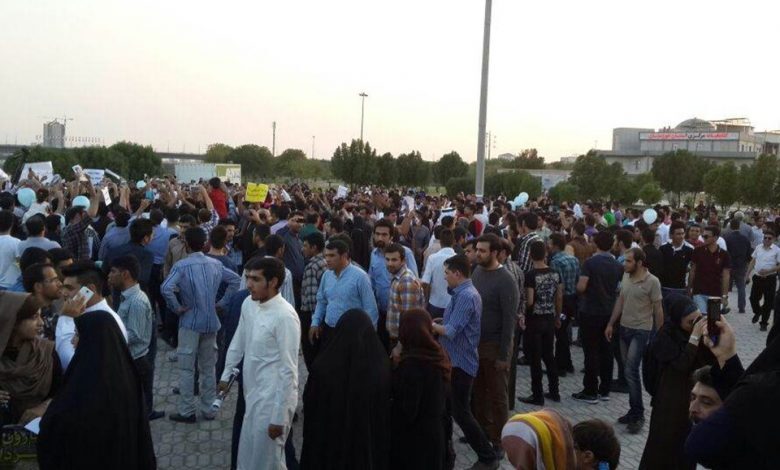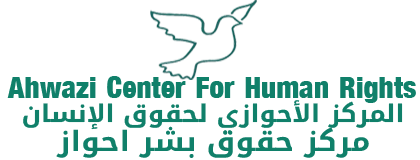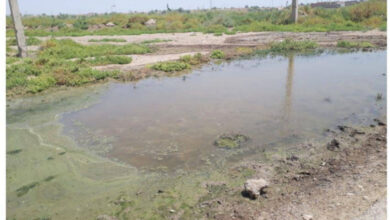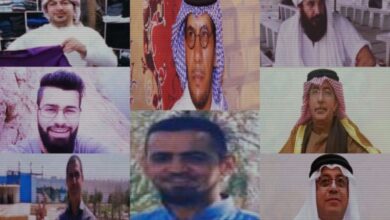Ahwazis protest at Iran’s manmade drought

Hundreds of Ahwazi people held a peaceful protest in front of the governor’s office in the eponymous regional capital, Ahwaz, demanding that Iranian regime authorities open the sluice gates on the network of massive hydroelectric dams built upstream on the region’s main rivers, which divert most of the region’s water supply to other regions of Iran, to allow water to flow to the parched region where a manmade drought is causing humanitarian and environmental devastation. While deaths have so far been limited to birds, animals and plant life, many Ahwazis believe that Iran’s regime sees this dreadful policy as a way to reduce the region’s indigenous Arab population.
Protesters held up placards and signs in Arabic, English, and Farsi with messages including: ‘Water is a human right’, ‘We are thirsty – give us water!’, ‘Stop killing our environment!’, and ‘Stop drying out the Ahwazi rivers and marshlands!’ The protesters also chanted slogans condemning the regime for its policies, such as ‘The regime stole our rights and our wealth!’ and ‘The regime keeps us in poverty in the name of religion!’
The protests come as hundreds of sheep, cattle, buffalos and other creatures have already died in recent days of thirst as a result of the drought caused by the damming and diversion of the rivers in the area once known for its rich farmland, with 90 per cent of the waters now redirected to Persian areas of Iran. The Ahwazi people, most of whose livelihoods depend on fishing or farming, are struggling to survive in the searing summer heat, which regularly exceeds 50 o Celsius (122 o Fahrenheit); many villages and towns are dependent on water trucks bringing supplies due to the remaining river water which they once relied on being largely undrinkable even by livestock. The river water and the water at the marshlands feeding into the Gulf are heavily polluted by chemicals from the regime’s petrochemical refineries and sugar industry, which pump untreated chemicals, in addition to raw sewage into the rivers, whose greatly reduced flow due to the upstream damming means that there is insufficient fresh water to wash away this build-up of toxic waste products.
The rivers which once teemed with fish and other marine life are now largely lifeless due to the pollution, which has killed millions of fish, as well as decimating the birds that once made the region’s vast marshlands an unparalleled nature reserve, while the wild buffalo that once grazed along the riverbanks are near extinction.
The Iranian regime’s blatantly racist policy of transferring desperately needed water from the already marginalided Arab region, whose people are subjected to brutal oppression, to ethnically Persian regions of Iran is causing further resentment among Ahwazis, whose warnings about the environmental and human catastrophe caused by the river-damming and diversion programme have been either ignored or seen protesters and environmentalists beaten, arrested and often imprisoned on fabricated charges.
The regime only opens the sluice gates on the upstream dams during the winter rainy season in order to alleviate pressure on the dams, deliberately channeling the water away from its oil and gas fields and refineries to Ahwazis’ towns and villages, leading to the indigenous people facing drought and rapidly worsening desertification in summer and severe flooding in winter that drowns towns and villages. In both cases, this is exacerbated by the severe and unchecked atmospheric pollution from the aforementioned oil and gas industry, with Ahwaz containing more than 95 percent of the oil and gas resources claimed by Iran.
One of the protesters participating in the demonstration said, “I don’t know where the regime officials are – are they asleep or are they blind, or do they just not want to hear or see the pain and hardship of people struggling to survive from the water crisis and poverty?”.
He pointed out that the regime has built over 17 dams on Ahwaz’ rivers to date, adding that although these are supposed to produce electricity for the whole of Iran, Ahwazis face power cuts every day, as well as having no water to drink. He condemned the regime for keeping Ahwazis in poverty and denying them jobs, which he said was a regime strategy designed to drive the Ahwazi Arab population from their lands and replace them with ethnic Persians who the regime encourages to move to Ahwaz, providing them with well-paid jobs and specially built settlements furnished with all amenities, both of which are denied to the indigenous Arab population.
“No jobs to Arabs means that they – the regime – want to force Ahwazis to leave their lands,” the protester added. “We won’t go – we’ll resist and we’ll fight till we get our land back!”
Similar chants, vowing resistance to the regime’s efforts to drive out the Ahwazi people, were taken up by the protesters, including ‘We won’t give up!’, ‘We won’t leave our homeland!’, and ‘We will live and die here!’
Another angry protester shouted at the governorate office, “All of the regime occupiers should leave our homeland – you must get out of our lands with your oppressive arms and tanks – we do not want your water, we want our own! If you withhold it, we’ll dig and find groundwater!”
Another of the demonstrators dismissed claims by regime officials that the water scarcity is due to natural drought: “The dams are filled with water, but the water is sent via many underground pipelines to Persian areas,” he pointed out, adding, “Ahwazi environmentalists went and saw with their own eyes that all the dams built on Ahwazi rivers have more than enough water for the whole of Ahwaz in terms of drinking, household use, irrigation and for feeding the Hor al-Azim and Falahiyeh wetlands, but the regime officials are deliberately shutting off the water to Ahwazis to pressure our people to leave – they drown us in winter by opening the dams and starve us and our lands and our livestock in summer! The regime officials are fighting the livelihood of Ahwazis, who depend on farming and livestock.”
Another protester ( in the above video) said, “The more we’ve shown respect for this regime, the more brazen they’ve got in oppressing us, impoverishing us – we want our rights from the oil and gas wealth taken from our lands, we want the water of our rivers to be used first for our people, and not to be stolen for Persian areas while we are dying of thirst!”
The organisers of the protest issued a statement on the occasion of the demonstration, calling on environmentalists worldwide, on the people of the region and on the international community to hear the Ahwazi people’s voices and to help save Ahwaz:
To the great people of Ahwaz and to international environmental organisations We, the residents of the Ahwaz region in the south and southwest of Iran organised a peaceful rally today, 10 July 2021, in front of the governor’s office of Ahwaz capital city to demand the following: – Granting the water dedicated to agriculture in the cities located downstream from the Dez and Karkheh dams—Susa and Al Qunaitra cities, Maysan plain and Howeyzeh and its affiliated villages. Thousands of hectares of fertile agricultural lands in the aforesaid cities are about to be devastated due to being denied access to water – the Horalazim international wetland has been dried up. This prompted many villagers to flee and leave the place. Hence, we demand our fundamental right to irrigate the Horalazim wetland.
We also demand that the discharging of wastewater by municipalities and industrial refineries in this wetland be stopped as they led to the terrible deaths of hundreds of cattle as well as hundreds of tons of fish.
According to the remarks of the governor of Ahwaz, none of the cities of the region have access to drinkable water. Accordingly, we urgently demand our basic right: clean and healthy drinking water.
Most of the residents of Ahwaz city suburbs, whose population is estimated at 700,000, once lived in areas west of the Karoon river. But they were forced to flee and emigrate from this area due to the lack of water, salinity, desertification, and the establishment of petroleum installations.
We call for ensuring the return of a large number of the residents to their areas through providing the necessary tools and potentials such as discharging water, paving the roads, securing gas, electricity and drainage network services. The cities of Ahwaz, Jarahi, Ma’shour, Falahiyeh, Muhammarah and Abadan—once called the land of palm trees—have seen the deaths of hundreds of thousands of palm trees and the destruction of their yield, which forced 14,000 of the orchard owners to leave their homeland. We the residents of Ahwazi cities call for identifying the perpetrators behind horrendous crimes against human being, environment and residents, and inflicting the toughest penalties against the culprits.
By Rahim Hamid
Rahim Hamid is an Ahwazi author, freelance journalist and human
rights advocate. He tweets under @Samireza42.




